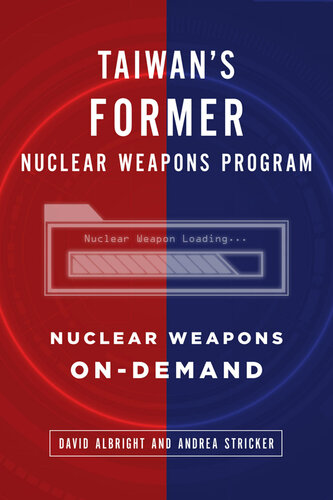Product desciption
Taiwans Former Nuclear Weapons Program Nuclear Weapons Ondemand David Albright by David Albright, Andrea Stricker instant download after payment.
Today, few would think of the peaceful island nation of Taiwan as a potential nuclear weapons proliferator. But just a few decades ago, following the Chinese civil war and loss of the ruling party, Kuomintang (KMT), to the Communists, the KMT government evacuated to the island, where a government-in-refuge, the Republic of China (ROC), was set up under the martial rule of the Chiang dynasty. The Chiangs were extremely concerned about what became the mainland Communist People’s Republic of China’s (PRC’s) threats to one day seize the island as its own. The father, President Chiang Kai-shek, and his son, Chiang Ching-kuo, successively presided over a secret nuclear weapons program aimed at deterring an attack and bolstering Taiwan’s prestige. As it became more diplomatically isolated following the PRC’s recognition as the legitimate government of China, Taiwan’s clandestine program picked up speed. It unfolded in a piecemeal fashion during the 1960s to 1980s, despite the PRC’s other threat that if Taipei ever developed nuclear weapons, Beijing would reclaim the island by force. By the mid-1980s, the nuclear weapons program of Taiwan aimed at bringing it within three to six months of being able to build a nuclear weapon, in essence, capable of making nuclear weapons “on demand.”
Taiwan’s Former Nuclear Weapons Program: Nuclear Weapons On-Demand, by David Albright and Andrea Stricker, for the first time gathers together and publicly details previously unknown information about key aspects of Taiwan’s nuclear program, including the status of various plutonium and nuclear weaponization activities throughout the 1970s and 1980s, the program’s plans and trajectory, the roles of various leaders and personnel, Taiwan’s nuclear strategic thinking, events that led to repeated confrontations over the program between Taipei and Washington, Taiwan’s main defensive ally, and finally, how the United States successfully pressured Taiwan to first limit and then end the program in 1988.
The book is bolstered by priceless, in-depth interviews with a major historical figure in the Taiwan nuclear saga – Dr. Chang Sen-I, known in the media as Chang Hsien-yi, a former deputy director at the principal nuclear institute on Taiwan. Chang informed for six years on behalf of the U.S. Central Intelligence Agency (CIA) about alarming, covert activities that were taking Taiwan close to a nuclear weapons capability. The CIA exfiltrated Chang to the United States in early 1988 once it decided to use his information as leverage to ensure that the program was ended for good. As one of Taiwan’s sole, major power allies following the late 1970s diplomatic recognition by most of the world of the PRC, the United States had an unusually large amount of influence over the ROC government on Taiwan. Despite this influence, however, the United States took well over a decade to fully thwart Taiwan’s steps to obtain nuclear weapons and devise strategies to limit it and ultimately achieve its denuclearization.
The story of Taiwan’s denuclearization is a true U.S. intelligence and diplomatic success story that may have prevented the nightmare scenario of a nuclear-armed mainland China confronting a much smaller, nuclear-armed Taiwan.


